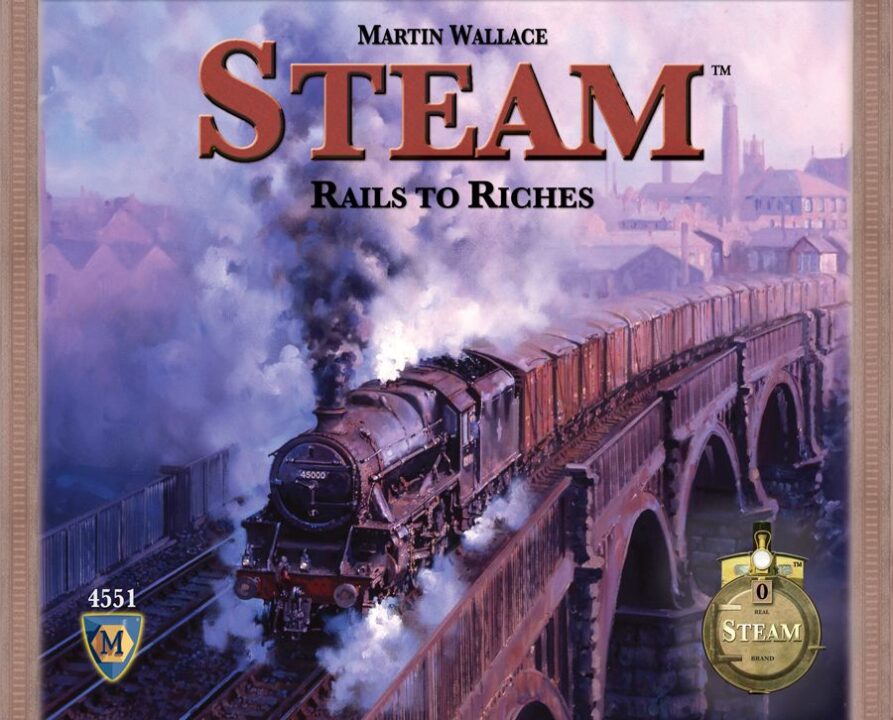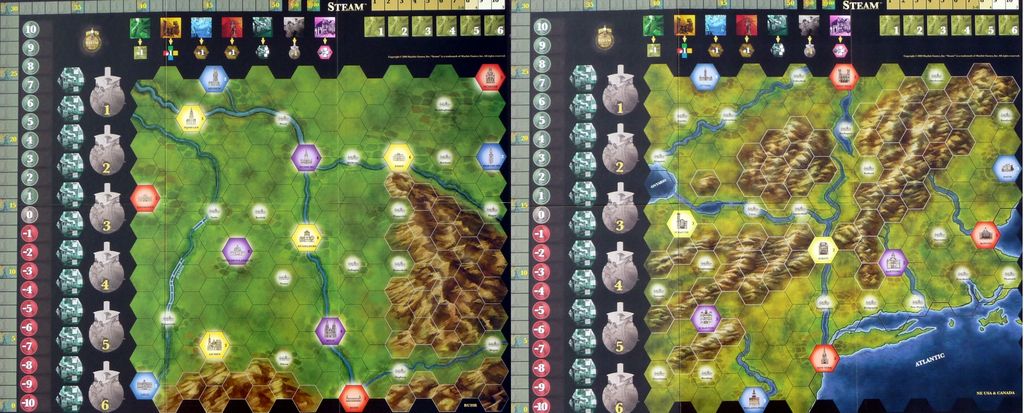Welcome, fellow cardboard wranglers! Strap in, because today I’m reviewing a game that made me question both my friendships and my city-planning skills. Yes, this is my honest review of Steam. After several nights of heated rivalries, questionable investment decisions, and at least one near-table flip, I’m here to help you decide if you should add this railroading beast to your collection—or just reroute those coins somewhere else. No spoilers yet, but if you hate train noises, brutally clever opponents, or sweating over track placement, you might want to sit this one out. For everyone else: all aboard!
How It Plays
Setting up
First, lay out the board and give each player a locomotive, some track tiles, and a pile of money that looks way too small. Put the goods cubes on the cities, and make sure everyone can reach the snacks. You’ll need them.
Gameplay
Each round, you’ll bid for turn order. This means you might spend half your money before even building a thing. Then, you build track, upgrade your train, deliver goods, and try not to go bankrupt. Everyone’s routes snake around, and sometimes your best friend blocks you so hard, you question your friendship. The choices feel tough: do you spend cash on more track, better trains, or just try to ruin Dave’s route?
Winning the game
Once the goods cubes have run dry or the track fills up, it’s time to count the points. Your score comes from deliveries and your company value. Whoever ends with the most points is the new railway tycoon—and gets to gloat until the next game night.
Want to know more? Read our extensive strategy guide for Steam.
Game Mechanics and Strategic Depth in Steam
Let’s talk about what makes Steam such a brain burner. The game throws you right into the world of train tycoons. And not just the kind who twirl their mustache while laughing about their piles of coal. Steam makes you plan every move like your reputation at the local train club depends on it. Spoiler: mine does. After my first game, they still call me “The Guy Who Leased Too Much.”
The core mechanics revolve around building tracks, upgrading cities, and picking the best routes for your goods. Easy? Ha! My first attempt looked like a spaghetti explosion on the board. The game gives you so many choices. Do you spend big early to build that juicy cross-map route? Or do you play it safe, staying small until the perfect moment? My friend Greg always goes bankrupt in the first three turns, so at least I know what NOT to do.
Loans make things wild. You can grab as much cash as you want, but every loan costs you at the end. I once mortgaged my imaginary grandpa just to get another engine. Strategy fans, rejoice: planning pays off in Steam. A single turn can make or break your whole network. The best part? There are no runaway leaders. If you see someone doing too well, you can block their route with your own track. That’s not mean, it’s business. I’ve lost friends, but built great railroads.
The game’s depth rewards clever play. You really have to weigh your options and prepare for unexpected moves. If you only like luck-based games, Steam will eat you alive. But if you want to feel smart—or at least pretend—this one’s a treat.
Up next: I’ll tell you why playing Steam with friends can turn your living room into a cutthroat boardroom. Stay tuned for tales of sabotage!
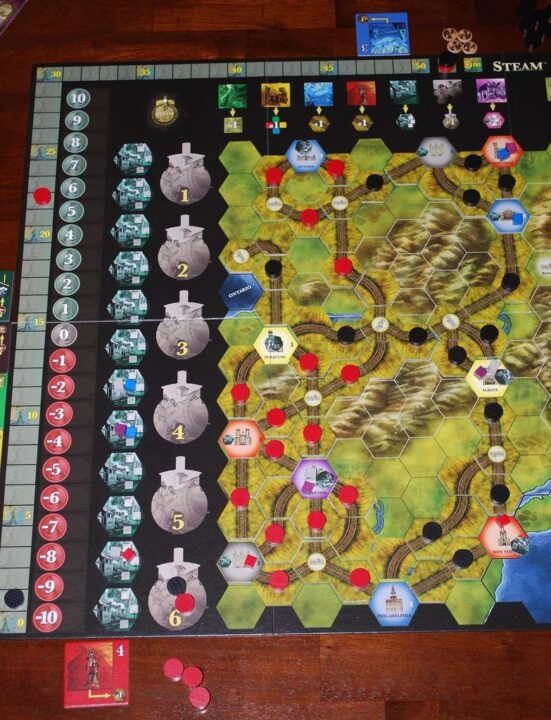
Steam: Players, Plots, and Passive-Aggressive Railways
If you’re the type who likes quiet evenings and polite handshakes, Steam might not be your cup of tea. The player interaction here can get spicy—think more jalapeño than vanilla. My own game group has had, let’s say, passionate discussions about routes and track blocking. In Steam, every move feels like a subtle jab at your rivals—or a straight-up jab, depending on how cutthroat you are with your train placements.
The competition kicks off right from the start. Bidding on turn order? That’s not just bookkeeping, that’s the first mind game. You want the best spot, but you don’t want to overspend and end up bankrupt before you’ve even laid a single rail. There’s also the battle for the best routes, and believe me, when someone builds track exactly where you’d planned, you’ll discover how creative you can be with your vocabulary. No joke—I still owe Andy an apology for that 3-minute rant.
Steam rewards players who keep their eyes on everyone else’s projects. You can’t play in a bubble, because someone will swoop in and nip away your perfect cargo chain. Sabotage? Not quite, but well-timed opportunism is definitely the name of the game. If you like games where you stare everyone else in the eyes and try to guess who’s about to ruin your day, you’ll love this.
Grab your conductor hat, because next stop, we’re talking Steam’s component quality and board design—don’t worry, there’ll be fewer hard feelings and more cardboard sniffing!
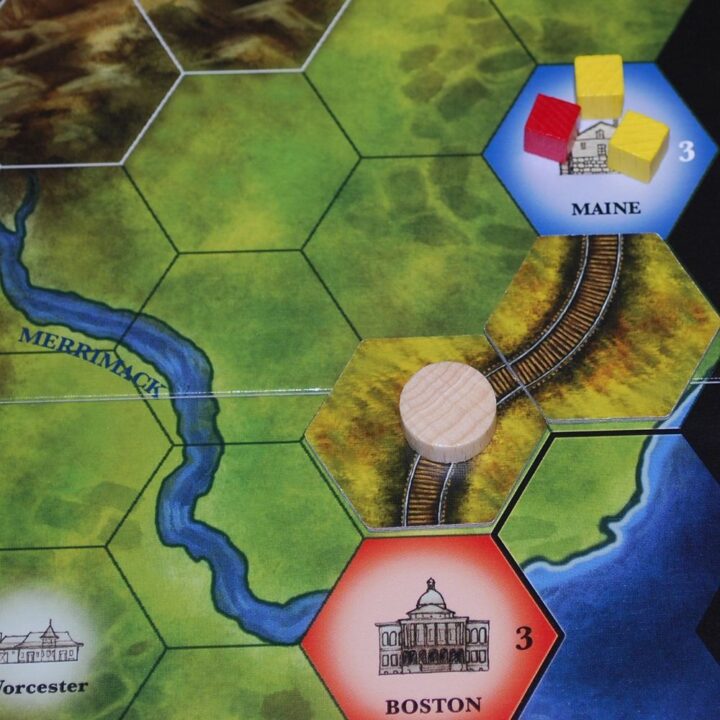
All Aboard the Quality Express: Steam’s Components and Board Design
I’ve played a lot of train games. Some use boards that look like a tax accountant’s napkin doodle. Luckily, Steam is not one of those. When you open Steam, you get a massive, shiny board that shouts, “Look at me, I’m a real railroad tycoon!” The hexes are bold and easy to read, and there’s just enough color so you don’t feel like you’re back in grade school geography class.
The wooden trains and tokens in Steam are the chunky kind I love. You won’t mistake them for splinters, and they’re big enough to avoid losing under the couch (unless you’re me, then it’s anyone’s game). The paper money is fine, but let’s be honest, nobody ever gets excited about fake cash unless you’re playing Monopoly at your grandma’s house. Everything is sturdy and feels built to survive years of passive-aggressive family game nights. The cards and player boards? Simple. They don’t win beauty contests, but they don’t need to. They do the job.
If you play with folks who spill cola or drop nachos, the components hold up pretty well. Just don’t use the rulebook as a coaster. The art isn’t going to win top prize at the Louvre, but it makes sense and stays out of your way. That’s a win in my book.
Next stop: We’ll chat about Steam’s replay value and how steep the learning curve really is—so grab your ticket and hang on tight, things might get twisty!
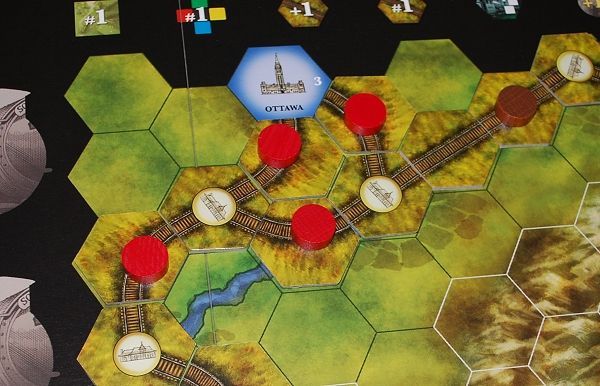
Replay Value and Learning Curve: Is Steam Worth Coming Back To?
I have played Steam enough times to say this: the replay value is sky high, a bit like my stress levels during the bidding phase. Every session with Steam feels unique because players hammer out different train routes and strategies. One game someone hogs the northeast; next session, everyone fights tooth and nail for the south. No two maps look the same by the end. The modular setup and player-driven track placement change things up every time.
But I will be honest—Steam is not a game you will breeze through on your first try, unless you are some kind of board game genius. The learning curve is, well, more of a learning mountain. The rules are chunky. Understanding how loans work, how to get money (and not go bankrupt like me on turn two), and how to optimize your deliveries takes time. My group had at least one person looking panicked during the first half hour.
But stick with it! Steam rewards repeated play. The more you play, the more your brain gets used to the train-based economic warfare. You’ll spot smarter moves, and maybe even win a game if you can keep your friends from stealing your routes. There’s always a new tactic to try, and just when I think I’ve got it—boom, someone blocks my perfect line and I’m back to square one.
So, do I recommend Steam? If you like a game that pays you back for learning it, and if you love replay value that’s off the rails (pun fully intended), then yes! Just expect to sweat through the first game or two.
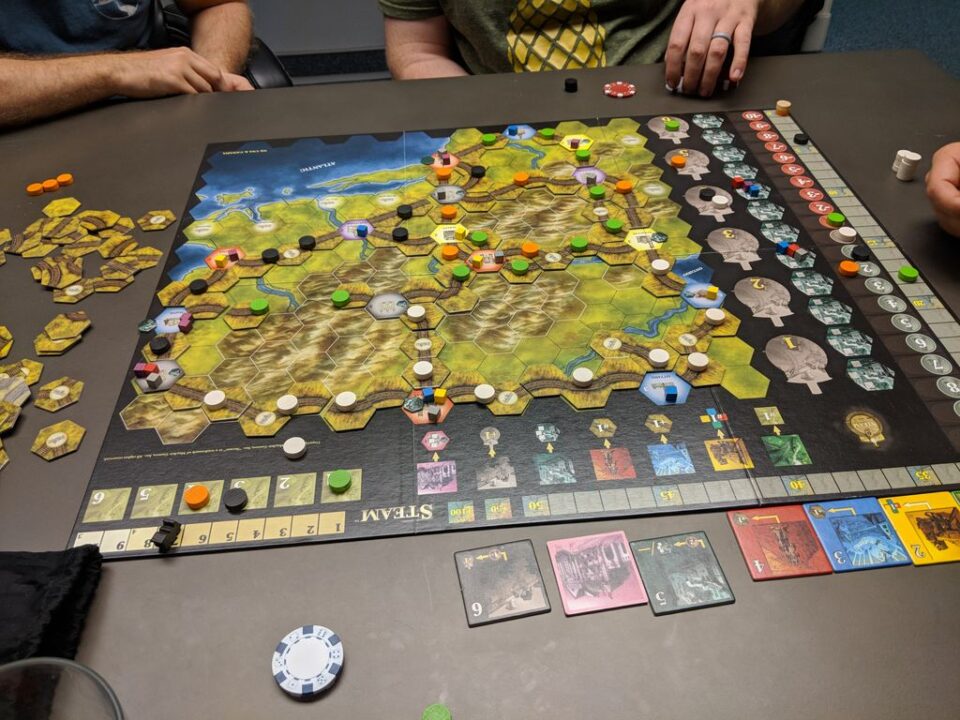
Conclusion
Steam is a real treat for folks who love planning and competition. The game keeps you thinking, with tense auctions and plenty of sneaky moves from your friends. While the board and pieces won’t win any beauty contests, they do the job. It’s a heavy game to learn, but if you like a brain workout and don’t mind a few rules, you’ll be hooked. Luck barely shows up here—what happens is all up to you. If you want a solid strategy game that keeps pulling you back, Steam’s your ticket. Thanks for reading this review, and may your trains always run on time!

